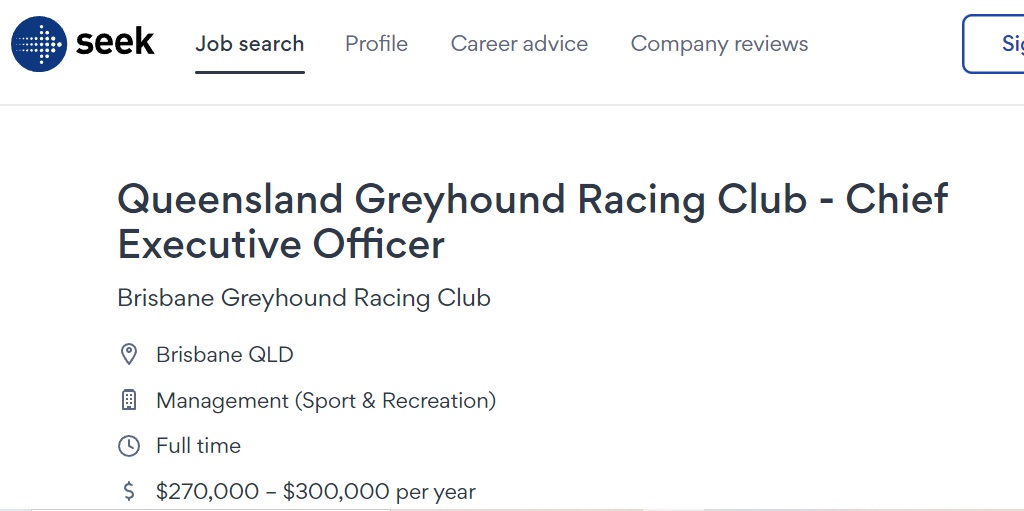Selection Criteria
- Relevant tertiary qualification in Sports Administration, Management, or a related discipline.
- Proven experience in a CEO, GM, or similar executive-level position.
- Proven track record in successfully leading significant organisational change initiatives within a dynamic and evolving environment.
- Demonstrated success in building and maintaining internal and external relationships.
- Exceptional leadership skills, with the ability to motivate and develop high-performing teams.
- Expertise and commercial success in Events, Marketing, and Communications in a professional sporting environment.
- A solid understanding of the landscape and intricacies of, as well experience in, greyhound racing will be highly regarded.
We hear inside and outside racing circles that the salary range for the recently advertised role of the foundation CEO of the QLD Greyhound Racing Club has attracted a huge interest from sporting administrators and others in Australia and around the world, and that the new club can expect to be flooded with applications for the position from aspiring leaders with well stacked resumes.
That’s a great endorsement of greyhound racing in this State, and for how far the industry has come under it’s outstanding leadership in the past few short years,
It’s no great surprise either, for there aren’t many jobs in racing – or in any sport outside the majors for that matter – that pay $300 grand a year plus perks.
This is one of them.
That’s not to say the salary is not deserved, for it is.
This is an important job, and the salary is commensurate with the responsibility.
But gee it’s attractive to potential applicants, as the flood of potential interest in the position has shown.
Which makes so many people curious about what the selection process for the job is or will be.
Here is the reason why.
Under the constitution of the new club there is a committee of six – three elected by the Brisbane Greyhound Racing Club (Albion Park), and three from Ipswich – who will decide the appointment.
The 6 had presently reduced to 5, as one of the elected Ipswich members – a Mr Steve Woods – has found himself unable to take up the position due to a change in personal circumstances.
This reduces the composition of the committee to 3 from Albion Park and 2 from Ipswich, creating an immediate majority.
How the 6th position will be filled and when is the issue of controversy.
There had been a Special General Meeting (or Extraordinary General Meeting) called for next Tuesday to vote on the matter, but this has now been cancelled, with the secretary of the Ipswich club announcing that Mr Woods role is to be filled as a casual vacancy, which means that the newly formed committee of the QLD club gets to choose the 6th member of the Committee, rather than the person being elected by the members of the Ipswich club whose member’s change of personal circumstances unexpectedly left them one short.
It’s a strange situation that has created genuine controversy within the greyhound industry, with many participants fearing that the 33 committee members from the Brisbane club will use their present majority to appoint someone to the position from within their own ranks, an eventuality that would create a total imbalance on the board and disrupt the agreed tenets of the creation of the new club through a merger of the two old ones, by giving Brisbane a 4-2 majority on the board.
We are not suggesting that this will happen, but a lot of people – particularly those from Ipswich – are concerned about the announcement, and believe that the member of their club who ran 4th in internal vote for their 3 members on the committee should go straight into the spot created by Mr Woods resignation.
It sounds to us like a matter for the lawyers or the courts should any disgruntled club members decide to bring a challenge, but it also raises questions as to how the appointment process for the CEO job might be impacted, given that the interim CEO – who is from the Brisbane club – is likely to be an applicant for the role, and an undoubtedly leading contender for it t00.
There is a simple way to resolve the latter concern in our view, and that is for an independent selection panel of suitably qualified professionals from outside of either of the old clubs, or the new one, to run a transparent recruitment process, and at the end of it make recommendations to the committee about the most suitable person for the role.
It’s clean, it’s clear and it’s easy, and it’s a best practice method commonly used in selections for senior appointments to major roles in both the government and the private sector, particularly at the top end.
Doing it this way would alleviate the concerns of those questioning the process, eliminate any criticisms of the selection, and ensure that the best candidate wins, which I am sure they will.
Voila, problem solved.
Of course the committee will still have the final say on who they select based on the independent panel’s recommendations, but that’s proper for it’s their constitutional right and role.
The alternative to our idea is that committee itself act as judge, jury and selector during the process, which is where the controversy began, and as such it isn’t an overly palatable solution.
It will be very interesting to see which course the committee adopts when its 5 elected members start work next week.
The other keen interest is when they will appoint their 6th member, and who it might be.
We will find out soon.
